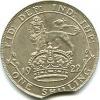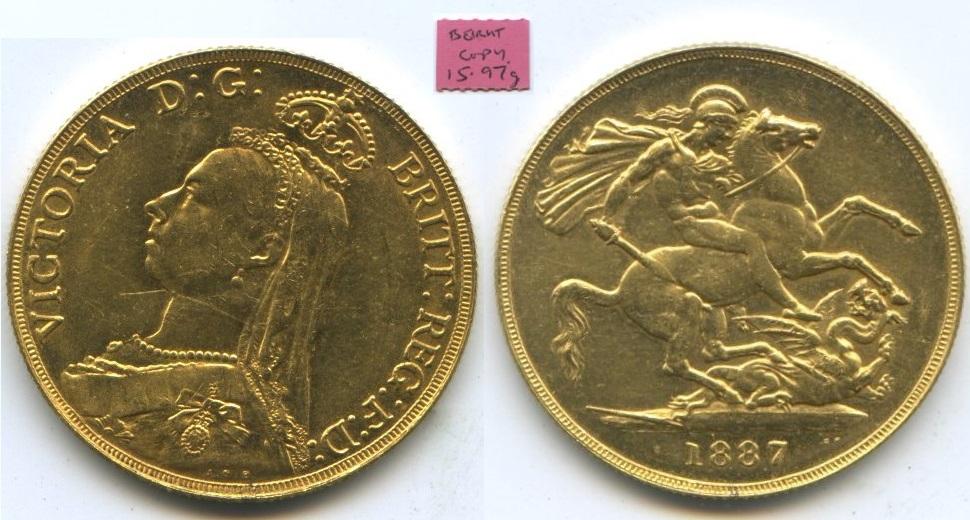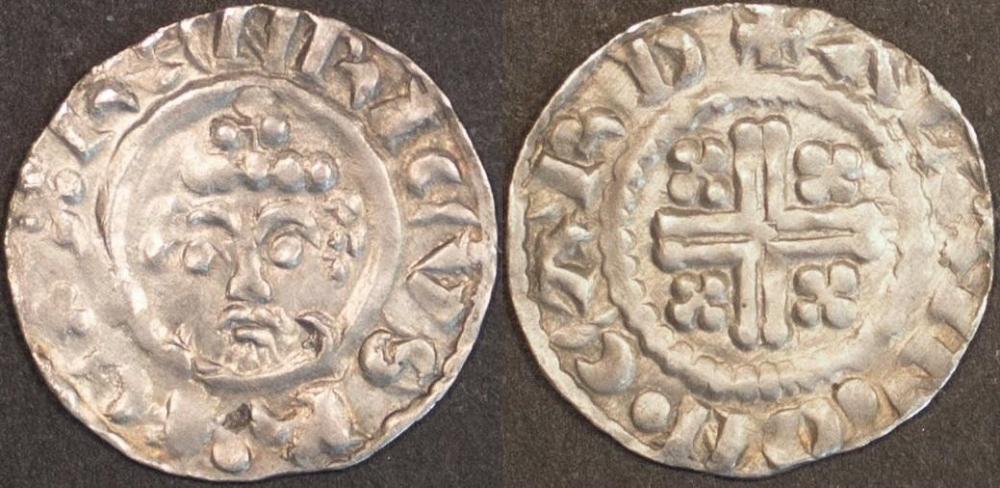-
Posts
12,799 -
Joined
-
Last visited
-
Days Won
347
Content Type
Profiles
Forums
Events
Downloads
Store
Gallery
Articles
Everything posted by Rob
-

possibly fake gold coins
Rob replied to Mr T's topic in British Coin Related Discussions & Enquiries
FEATURE The counterfeiting of British Victorian £5 gold coins in the 1960's The Public Records Office, Kew, has been recently given a "make over" and renamed the National Archives. Here are deposited the record books and official files of the Royal Mint. British law usually allows these to be examined after thirty years. One of these files, prosaically named: "Requests for examination of £5 pieces", Ref.2, allows us to find out about the glut of counterfeit £5 pieces which entered Britain in the late 1960's. The file is documented to cover the periods 1965 to 1969. It starts with a request, in November 1965, from the Customs and Excise to the Royal Mint to examine a 1887 £5 gold piece. This piece was one of a number imported from Kuwait by a Mrs.Akel, a Birmingham jeweller. It was alleged she was selling these pieces on to other small jewellers in the English Midlands. G.P. Warden, a principal scientific officer at the Mint, reported the piece was a counterfeit. This was based on the low weight and density of the piece, the incorrect number of millings on the edge and a number of visual defects on the coin. From the density of 17.05g/cc Mr.Warden estimated that the coin contained about 89% gold as against the 91.66% found in the genuine coins. The file contained a photograph of this coin and it is reproduced below. Photograph showing the 1887 Jubilee gold £5 ex. Mrs.Akel Type Weight Density Millings Mrs.Akel counterfeit 39.7204g 17.05g/cc 188 Genuine coin 39.87549 to 40.00507g 17.45 to 17.55g/cc 184 The file does not detail the visual faults of the counterfeit but examination of the photograph reveals a number. On the reverse, the body of St.George had not been completely "made" during the striking operation. Both The file does not detail the visual faults of the counterfeit but examination of the photograph reveals a number. On the reverse, the body of St.George had not been completely "made" during the striking operation. Both sides contained a large number of pimples and depressions. The pimples were especially noticable on the table next to the body and leg of St.George and on the bottom part of Queen Victoria's veil. There is also a small die crack visible near the top right hand side of the I of Victoria. -

possibly fake gold coins
Rob replied to Mr T's topic in British Coin Related Discussions & Enquiries
There was a piece written about the 'Beirut' copies of 1887 £5 & £2s that came out of the middle east in the 60s. Attached are a couple of images showing the approximate die axis of the two copies and the bit that was written. Note the milling differences for the £5. FWIW, I think the £2 looks a bit iffy and the weight is low. Dodgy 1887 5 pounds.docx Doesn't seem to want to load -
Never heard of her.
-
-
I wonder if they were restruck to produce another coinage? The RM has always done all sorts of non-currency strikes, which also offers a solution to the low numbers seen. And if you really want to speculate - how about the 1981 10ps being used as blanks for the uncirculated sets. Mintage of large 10ps for the period 1982 to 1992 is just over 1.9m. Add in another 955k or so for the proofs and you are left with approx. 0.5m. Does either total or both added together more accurately reflect the observed rarity?
-
The 1916 reverse surface doesn't look particularly natural to me. It may the coin has been over-dipped. It obviously has wear, so you would expect to see a little more toning rather than the uniformly flat surfaces. The 1887 is nowhere near VF. Somebody should be shot.
-
That was fun, wasn't it. 12 hours and 2 minutes start to finish for 576 lots. There was some fairly ambitious bidding today. I thought I had done well in the morning session (which started at 10:00 and finished at 17:50) to make underbidder on one lot, albeit at nearly 3x book. When some things were going for up to 10x estimate and few lots reflected the book price, the overall results were always going to be good. Greg Edmund's comment that after half the lots in the morning, the lower estimate had been reached, was a good indicator of things to come. The afternoon session was halfway to lower estimate after 3 lots. On the plus side, I did manage to get 2 lots.
-

Halfpenny ID check
Rob replied to mrbadexample's topic in British Coin Related Discussions & Enquiries
-
I think it has rotated nearly 180 degrees between strikes because you have HENRICV starting at 6:30 and NRICVSREX starting just past 12 o'clock. N & R are ligated and I'd say pellet in oval eyes, but still 3c. I'm not 100% sure about the mint, but it does look like it could end in OFER - which would be York. ION is everywhere which is unhelpful..
-
That's all wrong.
-
Fine, gVF but looks cleaned, aVF, nVF, VF and nVF. Don't worry about the grade if you like it - just don't pay too much without the necessary knowledge. Once you are up to speed it is possible to justify paying over the odds. At the end of the day, collecting is a selfish thing. It's all me me me.
-
Probably having difficulty understanding the numbers, so he's used copy and paste from somewhere. He can't spell Leicester, so a lack of numeracy would merely be an extension of this.
- 1 reply
-
- 1
-

-

spink numsimatic circular
Rob replied to Mr T's topic in British Coin Related Discussions & Enquiries
The Circular was online in the archive section until about 2011-12 when the previously very dysfunctional site was taken down and replaced by something a little less unpredictable. 15/6d for an 1857 penny was a lot in 1895 when the regular pieces were going for 9d up to 2/-. I see it was priced at about the same level as a Fine 1860 -
It purports to be a Carlisle short cross penny, but is obviously a modern copy as the mint signature is CARL which doesn't exist, the valid readings being CAR, CARD, CARDI or CARDV. Alain or Alein strikes in classes 1b, 1c, 3 & 4b at Carlisle, but exactly which class it is trying to be is impossible to say with so much being wrong. A class 1c is attached to give an idea what it is imitating.
-
It's a difficult one. We all know the market is a bit hot at the moment, but it wasn't always the same, and there are always some pieces that slip under the radar. We also have our own view on what a particular coin is worth - is the estimate low, high or just right? Say you are Spink and have to put an estimate on the lot. You have an annual tome with prices which should provide a good guide to the expected outcome at auction and DNW etc will almost certainly be in the same ballpark, but that can never account for two individuals determined to buy the coin and we've all been there. The recent monopoly of on-line auctions has also ensured that buying is now relatively concentrated on a small number of outlets, with a larger number of buyers taking part. This has to partly responsible for the uplift in prices. But is not always the case, as conversely, many lots in the Bates sale for example went for peanuts and a lot less than he paid. Estimates will also reflect the reserve required by the vendor. If a vendor insists on a high reserve, the estimate must reflect that. If there is no reserve then it can be set at any level and will almost certainly be at one which is guaranteed to sell, the admin of dealing with unsold lots not having great appeal to the auction house. Spink used to buy in unsold lots at a percentage of estimate and list them in the Circular, but that obviously no longer happens. Unsolds therefore have to be returned to the vendor, or included in a subsequent sale. The anarchy penny from Tutbury that was the subject of a thread on this forum was listed a few times with DNW and eventually sold for about 60% of the original estimate. i.e. the vendor wanted too much. I suppose the only thing that matters is the price you would be willing to pay, because the estimate is irrelevant to the final outcome, whatever the level. And that means doing your homework if you want to pay something in line with the current market.
-
Holed, corroded and split/cracked makes 165 a tad optimistic. £50-60 maybe.
-
Blue is a popular colour. I always assumed the light blue dot on the back of this slab was the colour they ordered.
-
No they're not - they're as variable as they ever were. We just highlight the obvious outliers as we encounter them. There's plenty more where that came from.
-
If someone is stupid enough to pay them to do so, then yes. They would only be satifying a demand in the market to confirm that what you have is genuine tat of the highest quality. Nothing finer - or so they say..... I reckon, if you looked around, you could find an even bigger load of b*****ks somewhere. Edit to say - found some. I wonder if they will grade as premium quality? https://www.google.com/imgres?imgurl=https%3A%2F%2Fupload.wikimedia.org%2Fwikipedia%2Fcommons%2F3%2F37%2FCriadillas_de_Choto-_Madrid.jpg&imgrefurl=https%3A%2F%2Fen.wikipedia.org%2Fwiki%2FTesticles_as_food&tbnid=NSrnzvae4TXETM&vet=12ahUKEwi596OP_tfuAhUJ-4UKHRr7A8cQMygAegUIARCYAQ..i&docid=fieVeu65fqJ6RM&w=2592&h=3888&q=bulls testicles images&client=firefox-b-d&ved=2ahUKEwi596OP_tfuAhUJ-4UKHRr7A8cQMygAegUIARCYAQ
-
How does that sit with the requirement that slabs should be sealed to stop access to the coin? Is it an MS70 vending machine? Put some money in the slot and you get a graded drink? I'm going for them being 'Poor'. Not sure about 'Have a Coke' - LSD may be more appropriate...................







